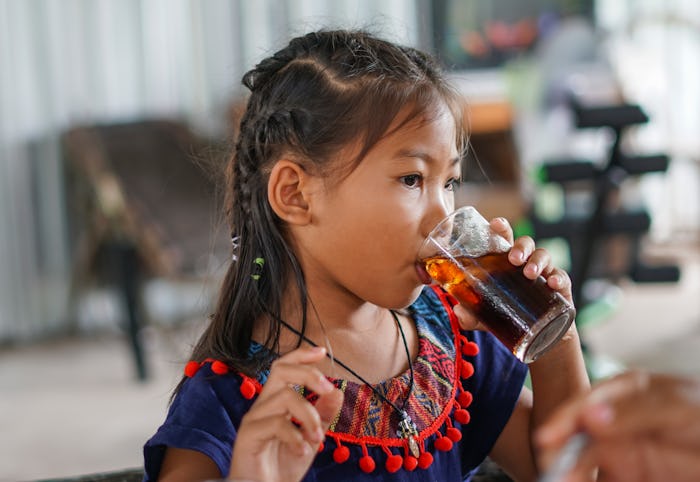*Pop* *Fizz*

Can Kids Drink Poppi, Olipop, & Other Prebiotic Sodas?
Parents should know a few things first.
Green powders, gummy vitamins for every aspect of our health, and protein shakes of all kinds — there are so many wellness supplements and “healthy” alternatives available to buy these days, it’s hard to know what you actually need. And, even more importantly, it’s not always easy to tell what’s safe to offer your kids. So, if you’ve ever wondered about the prebiotic sodas, we asked a pediatric dietitian: Can kids drink Poppi, Olipop, and other products like them?
If you’ve seen them on store shelves but haven’t tried them yet, prebiotic sodas are basically new takes on our favorite flavors of soda. Olipop and Poppi are the big brands sold in most major chain stores, but there are other, smaller names too. In general, they aim to be lower sugar than regular sodas (one Coke has 39 grams of sugar while Olipop’s cola flavor contains 2 grams), which makes them lower in calories, too. And, they usually have some sort of wellness-y ingredient too. Olipop uses prebiotics and plant fiber to support gut health, while Poppi includes a blend of prebiotics and apple cider vinegar.
Can kids drink Poppi, Olipop, and other prebiotic sodas?
Similar to regular soda, juice, and other beverages, most pediatric health experts are going to advise parents to steer clear of Poppi, Olipop, and other brands simply because you want to limit added sugar in your kid’s diet. But it’s a good compromise if you’re trying to get your child to reduce their soda intake.
“If you really can’t get your kid to stop drinking soda, it’s definitely a good switch. Usually, we recommend to stay under 25 grams per day of added sugars, and that’s just the U.S. dietary guidelines. So, as long as it’s within that guideline, I think it’s definitely a good option to switch to,” says Lindsey Donovan, MS, RDN, a pediatric clinical dietitian at Wolfson Children’s Hospital of Jacksonville.
Soda flavors and sugar aside, what’s the deal with the prebiotics? Are they OK to give kids? Both Poppi and Olipop say on their websites that their drinks are kid-safe. “Prebiotics are basically these non-digestible fibers, and it acts as food to probiotics, or your good gut bacteria. We can get those from a variety of foods,” says Donovan. “For kids in particular, generally they’re safe, but one thing to look out for is added sugar. If you do want to get some other prebiotics and you don’t want to give all the added sugar, parents can give things like bananas, oats, soybeans, and other foods like that that have prebiotics in them.”
Some of the other ingredients in prebiotic sodas might make you wonder if the drinks are safe for kids — some brands contain apple cider vinegar, and many boost their sweetness by using plant-based artificial sweeteners. Giving the ACV-containing sodas to kids doesn’t worry Donovan one bit. However, she points out that there isn’t much research on how artificial sweeteners impact kids, so Donovan can’t say for sure if there are any negative short- or long-term effects. Whether or not to steer clear of them will depend on what feels right to you.
You should also be mindful of which flavors of prebiotic soda your child wants to sip on. The flavors emulating other sodas, like Olipop’s Dr. Goodwin (Dr. Pepper), Vintage Cola (Coca-Cola), and Cherry Cola contain 50 milligrams of caffeine per can. It’s estimated that Poppi’s Doc Pop and Classic Cola contain roughly 32 milligrams of green tea-based caffeine each. As a rule of thumb, pediatric health experts caution against kids under 11 consuming any caffeine at all, and they say kids 12 to 17 should limit their intake to 100 milligrams a day.
Overall, prebiotic sodas make a solid alternative to regular ones, boasting less caffeine and sugar and some helpful gut benefits. Parents will need to gauge how comfortable they are offering their kids artificial sweeteners, but everything else in these cans is well understood and pediatric dietitian-approved.
Expert:
Lindsey Donovan, MS, RDN, a pediatric clinical dietitian at Wolfson Children’s Hospital of Jacksonville